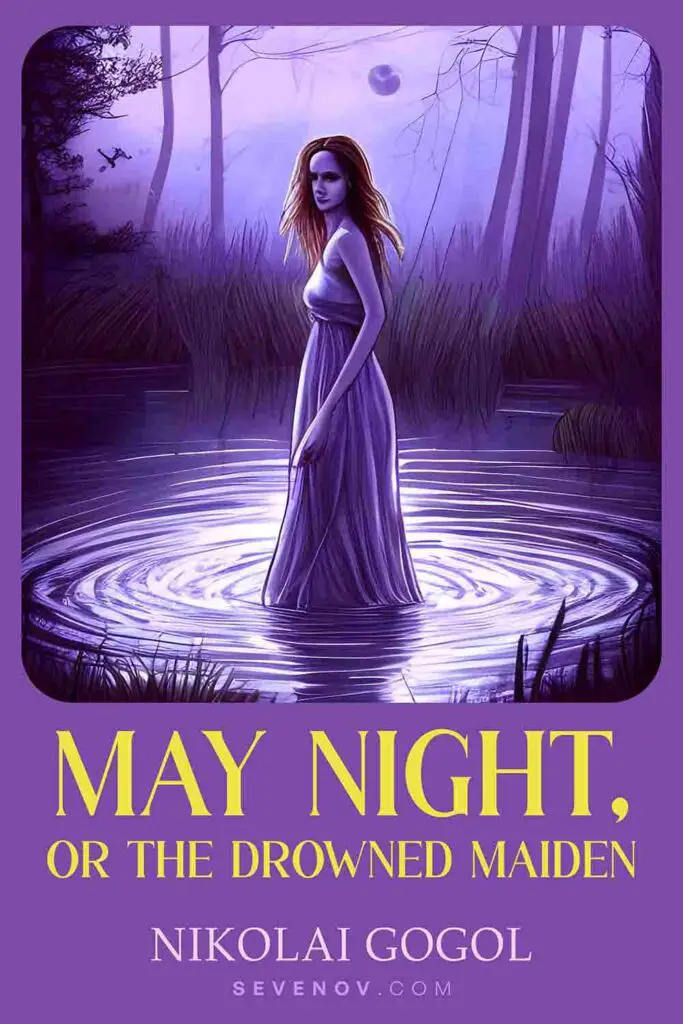
May Night, or the Drowned Maiden by Nikolai Gogol
Author: Nikolai Gogol
Published: 1831
Genre: Short Story
“May Night, or the Drowned Maiden” (Майская ночь, или Утопленница translit. Mayskaya noch’, ili Utoplennitsa), also commonly known as “A May Night,” is a short story by Nikolai Gogol. It was first published in 1831 in the first volume of his short story collection Evenings on a Farm Near Dikanka. The story was adapted into an opera, May Night (1880), by Nikolai Rimsky-Korsakov.
1. Synopsis
Levko, the mayor’s son, is in love with Hanna, but his father is not pleased with the match. As they walk on the village outskirts, Levko tells Hanna the tale of a girl who threw herself into a pond when her father was charmed by her witch stepmother into chasing her out.
In the same pond, there are ghosts of other maidens who have drowned there.
One night, the witch passed by the pond, and the girl pulled her in, drowning her. However, the witch changed her form into another drowned maiden, so the girl could no longer guess who the witch was. To win Hanna’s hand in marriage, Levko has to help the girl’s ghost figure out which of the maidens in the pond is the witch.
2. Story Summary
Levko, the mayor’s son, is in love with Hanna, but his father disapproves of their relationship. He goes to Hanna’s house to discuss marriage, and they take a walk on the outskirts of the village. The two pass by an old, shuttered house with a shimmering pond in front of it. Levko tells Hanna a story related to the pond about a young girl loved dearly by her widower father until he remarried.
The father’s new wife was a witch who charmed him into throwing out his daughter. In despair, the girl drowned herself in the pond. In this pond, there are ghosts of other maidens who drowned there, and on moonlit nights, the girl’s ghost will gather all the other drowned maidens to warm themselves in the moon’s rays.
One night, the witch passed by the pond, and the girl’s ghost pulled her in, drowning her. The witch changed her form into that of another maiden who had drowned. Hence, the girl is unable to tell which of the maidens in the pond is the witch.
After telling Hanna the story of the drowned girl, Levko kisses her goodbye and leaves.
On a beautiful night, a drunken reveler named Kalenik is tricked into entering the mayor’s house by a group of mischievous girls. The mayor, Levko’s father, lives with his sister-in-law, with whom he is having an affair. At the same time, he is in love with Hanna, which is why he disapproves of his son’s relationship with her.
Levko catches his father trying to woo Hanna and, in a rage, decides to get revenge on him with the help of his friends. The young men go off, preparing to prank the mayor.
The brandy distiller comes to visit the mayor. While the two men are chatting, Kalenik enters the room, thinking he is in his own house. The mayor is furious that Kalenik has intruded into his home and wants to throw him out. However, the superstitious brandy distiller believes it is bad luck to turn out a guest who has already seated. He urges the mayor to let Kalenik stay.
The mayor and brandy distiller hear a commotion outside the house. A group of rascals is playing the guitar and singing a song insulting the mayor. The mayor drags one of them, a bearded and sooty-faced man, into the house and throws him into the cellar. Later, the mayor realizes that the sooty-faced man is his sister-in-law. Levko and his friends had dressed her as a demon and applied soot to her face.
Upset at being mistreated, the mayor’s sister-in-law flees the house. She then goes outside and is captured again by Levko’s friends. They throw her into a hut, where she is nearly burned alive by the mayor and his friends.
After a night of pranks, Levko sleeps near the old house with the mysterious pond in front of it. In his dream, he sees a girl in the house. The girl asks him which of the maidens in the pond is the witch. Levko notices a maiden who enjoys playing the part of a hawk in a game and has a black form. He recognizes this maiden as the witch, and the girl thanks him by giving him a letter that will help him persuade his father.
Levko wakes and gives his father the letter. The letter appears to be from the local commissar, who instructs the mayor to clean up the village and allow his son to marry Hanna. The mayor agrees and arranges for the marriage of Levko and Hanna.




